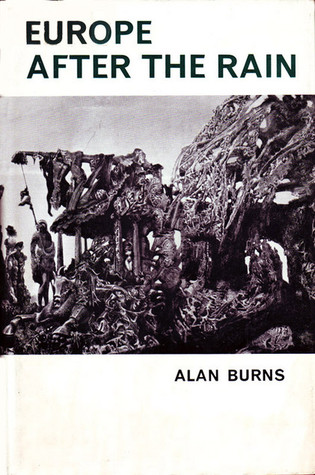 By ALAN BURNS (John Day; 1965/70)
By ALAN BURNS (John Day; 1965/70)
Here’s something I know will scare off quite a few of my readers: an overtly experimental novel about a post-apocalyptic England. As with most experimental writing it’s not an easy or inviting read, being asynchronous, fragmented and highly style-conscious. To many of you I’m sure EUROPE AFTER THE RAIN will seem the epitome of 1960s self-indulgence, a view reinforced, perhaps, by the fact that its author, the late Alan Burns, is praised on the book jacket as “one of the most important British novelists to emerge in the past decade” but has been largely forgotten in the succeeding years.
Yet this novel exerts a definite unsettled fascination, even if reading it does admittedly take some work. Its inspiration was Max Ernst’s surreal painting of the same name, and surreal is something this novel certainly is, in both its overall construction (we never learn why the world it depicts is in such disarray, or even the particulars of its unnamed protagonist) and incidental details (“the road approached from the far side, the wide road, its animal feet moving, pulling, it died away in the reeds along the banks”). Throughout, the prose is studiedly detached and unemotional, with descriptions rendered in a deliberately perfunctory manner.
This apathetic worldview is in fact a survival mechanism on the part of the narrator. He exists as a detached observer to the horrors surrounding him, which include looting, random murder and overtly fascistic behavior by the military units tasked with keeping order. In the course of his odyssey the protagonist falls in with one of those units while searching for a mysterious girl he was apparently supposed to look after. Long story short: he eventually finds the girl, and also contentment (of a sort).
This novel may well have been an influence on Anna Kavan’s ICE (1967), which also concerns a nondescript man searching for an unnamed young woman amid an atmosphere of surreal devastation. That novel’s lush and evocative imagery, however, stands in stark contrast to the resolutely stark and emotionless stance of EUROPE AFTER THE RAIN, which difficult or not casts a singularly haunting spell.
